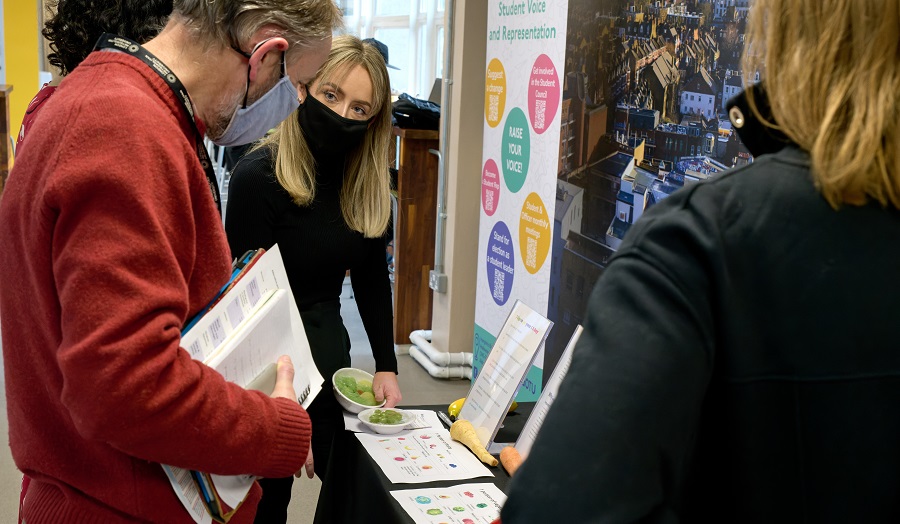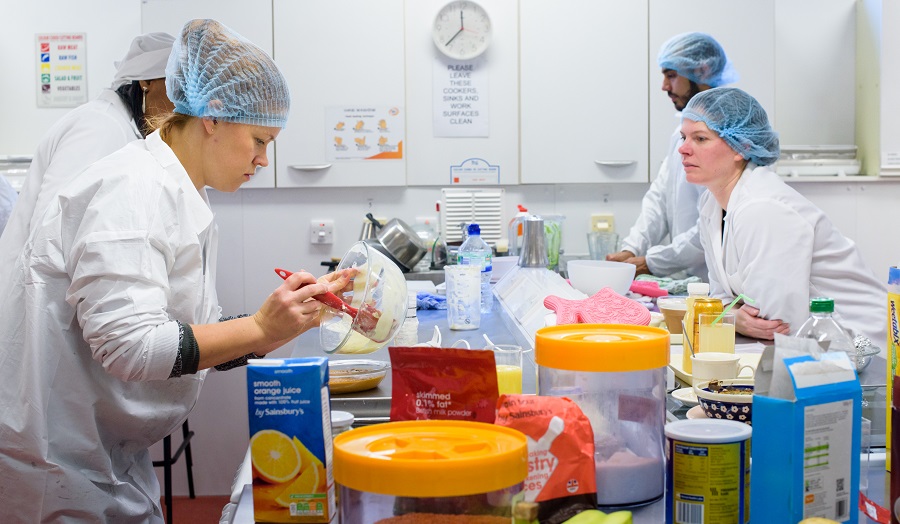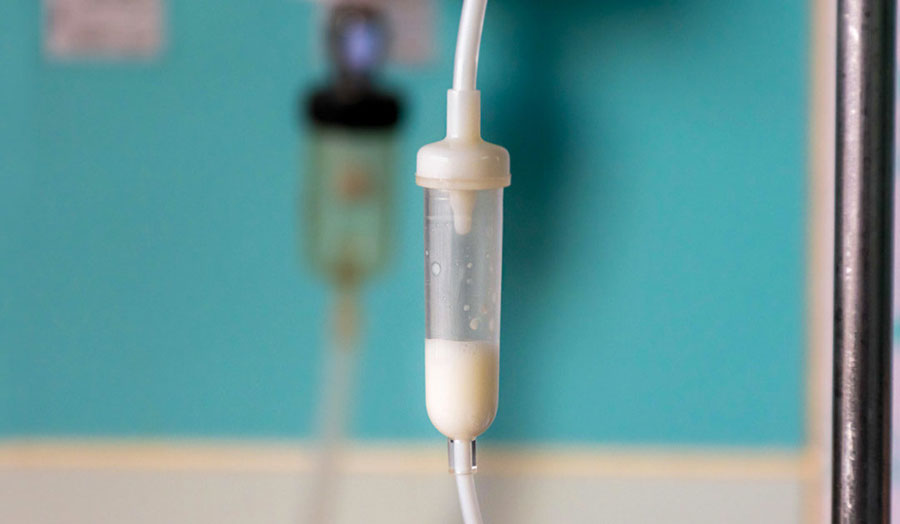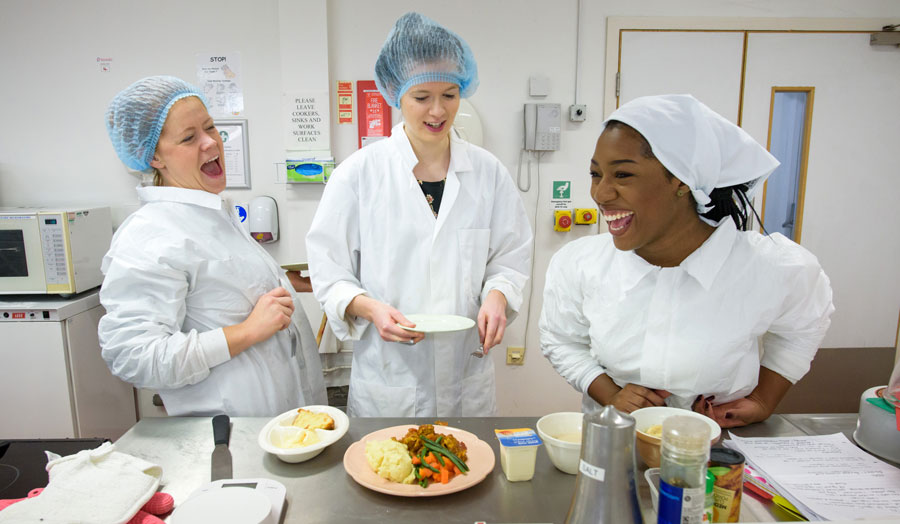Apply for this course
Please select when you would like to start:
If you're a UK applicant wanting to study full-time starting in September, you must apply via UCAS unless otherwise specified. If you're an international applicant wanting to study full-time, you can choose to apply via UCAS or directly to the University.
If you're applying for part-time study, you should apply directly to the University. If you require a Student visa, please be aware that you will not be able to study as a part-time student at undergraduate level.
Why study this course?
If you're passionate about improving human health through better nutrition and disease prevention, then this degree, accredited by the Association for Nutrition, will give you an excellent grounding in both scientific and applied public health nutrition. During this course you’ll have the opportunity to take part in hands-on laboratory sessions in our state-of-the-art, £30 million Science Centre, which features specialist nutritional physiology and food technology labs.
Our nutrition and food science courses are ranked second in the UK and best in London according to the Guardian University Guide 2024.
Top five in London for teaching
This course was ranked in the top five in London for teaching quality according to the National Student Survey 2024
Accredited by the AfN
On graduation, you'll be eligible to join the Association for Nutrition (AfN) as a Registered Associate Nutritionist (ANutr)
Third in London for student satisfaction
Our food science courses are ranked third in London for student satisfaction, according to the Complete University Guide 2025
Course modules
The modules listed below are for the academic year 2024/25 and represent the course modules at this time. Modules and module details (including, but not limited to, location and time) are subject to change over time.
Year* 1 modules
Year 2 modules
Year 3 modules
Anatomy and Physiology 1 (for Life Sciences)
This module currently runs:autumn semester - Monday morning
(core, 15 credits)
This module introduces students to the theoretical and practical aspects of human anatomy and physiology in health and disease. It is designed for life-science students with an interest in human biology.
This module aims to provide students, through lectures, tutorials and practical classes, with a sound knowledge of human body structure using appropriate anatomical nomenclature and an in-depth understanding of the physiology of selected body systems. The module will also aim to introduce basic concepts in immunology and pathology.
Anatomy and Physiology 2 (for Life Sciences)
This module currently runs:spring semester - Monday morning
(core, 15 credits)
This module introduces students to the theoretical and practical aspects of human anatomy and physiology in health and disease. It is designed for life-science students with an interest in human biology.
This module aims to provide students, through lectures, tutorials, and practical classes, with a sound knowledge of human body structure using appropriate anatomical nomenclature and an in-depth understanding of the physiology of selected body systems. The module will also aim to introduce basic concepts in immunology and pathology.
Applied Health Psychology (for Nutritionists)
This module currently runs:spring semester - Monday afternoon
(core, 15 credits)
Through successful completion of the module, learners will develop a broad understanding of psychology in relation to health and nutrition behaviour. Learners will also further develop skills in professionalism such as presenting skills and team working.
The aims of this module are aligned with the qualification descriptors within the Quality Assurance Agency’s Framework for Higher Education Qualifications.
Specifically, it aims to provide learners with knowledge and understanding of the psychological theories relevant to the practice of nutrition and dietetics. Also, the Health and Care Professionals Council (HCPC) Standards of Proficiency for Dietitians and Association for Nutrition (AFN) Code of Ethics and Statement of Professional Conduct for nutritionists.
Relevant aspects of nutrition & dietetic practice, theory and research will also be studied. This module also aims to provide learners with the qualities and transferable skills necessary for employment requiring the exercise of some personal responsibility.
Read full detailsBiochemistry for Life Sciences
This module currently runs:spring semester - Thursday morning
(core, 15 credits)
The aims of this module are aligned with the qualification descriptors within the Quality Assurance Agency’s, Framework for Higher Education Qualifications. This module is concerned with biochemistry focusing on the properties of key biochemical molecules and their role in biochemical function. This module aims to provide students with the qualities and transferable skills necessary for employment requiring the exercise of some personal responsibility.
Read full detailsCell Biology (for Life Sciences)
This module currently runs:autumn semester - Monday afternoon
(core, 15 credits)
A core module which provides students with an understanding of basic cell structures and an awareness of different cell types and relates the structure and activities of cell components to their functions and to cellular activities as a whole.
The second half of the module is concerned with biochemistry focusing on the properties of key biochemical molecules and their role in biochemical function.
The aims of this module are aligned with the qualification descriptors within the Quality Assurance Agency’s Framework for Higher Education Qualifications. Specifically, it aims to expose students to some of the key questions of cell biology concerning cell structure and intracellular activities. Provide students with practical experience in a range of laboratory-based biological techniques. Enhance students' ability to manage themselves and to develop organisational, critical and analytical skills which are applicable to the workplace.
Essentials of Human Nutrition
This module currently runs:spring semester - Wednesday afternoon
spring semester - Thursday afternoon
(core, 15 credits)
The module focuses on increasing your understanding of diet and health. Students will develop their knowledge of food quality, non-nutrient components of food, the effects of food processing and food fortification. The role of macronutrients in the aetiology of severe acute malnutrition will be explored. The module will provide an understanding of the link between dietary patterns, lifestyle and non-communicable diseases. Beyond scientific knowledge related to nutrition, the module will enhance your numeracy skills, food preparation and cooking skills. Nutrients, foods, diets, and their effects are considered from a global and UK perspective reflecting the globalisation of the food chain, the diversity of our students, and their future employability.
1. You will take part in food preparation and cooking to gain understanding of how aspects of food preparation can affect nutritional quality.
2. You will undertake nutrient analysis using a variety of databases.
3. Your will gain understanding of the role of diet through the lifecycle.
4. You will develop skills in food labelling, nutrition and health claims.
Health, Society and Behaviour (for Nutritionists)
This module currently runs:autumn semester - Wednesday morning
(core, 15 credits)
Through successful completion of the module, learners will develop a broad understanding of sociology in relation to health and nutrition behaviour.
Learners will also begin to develop skills in professionalism and have a better understanding of employment opportunities and job application processes.
The aims of this module are aligned with the qualification descriptors within the Quality Assurance Agency’s Framework for Higher Education Qualifications.
Specifically, it aims to provide learners with knowledge and understanding of sociology relevant to the practice of nutrition and dietetics. Also, the Health Care and Professions Council (HCPC) Standards of Proficiency for Dietitians and Association for Nutrition (AfN) Code of Ethics and Statement of Professional Conduct for nutritionists.
This module will support learners to reflect on the range of employment opportunities available. Relevant aspects of nutrition & dietetic practice, theory and research will also be studied. This module also aims to provide learners with the qualities and transferable skills necessary for employment requiring the exercise of some personal responsibility.
Read full detailsIntroduction to Human Nutrition
This module currently runs:autumn semester - Wednesday afternoon
(core, 15 credits)
The module introduces learners to fundamental topics in nutrition and provides an overview of nutrition and health. It develops understanding of the nutritional composition of foods, the main sources of foods in the diet and their metabolic and physiological roles. Concept of energy and energy balance are introduced.
In addition, the nutritional and physiological factors which impinge on food choice are explored. This module underpins the human nutrition content and thread of the course and encourages engagement with nutrition science from the outset. It ensures that students are equally equipped with basic nutrition science concepts, regardless of their entry-level understanding, before engaging in more complex aspects in subsequent years.
1. You will be introduced to current topics in nutrition and develop an overview of nutrition and health.
2. You will develop concepts of energy intake and energy expenditure.
3. You will learn how to calculate the absolute and relative value of nutrients.
4. You will be introduced to nutritional research, current recommendations and policies.
5. You will be informed about professional issues in nutrition in relation to ethics and code of conduct.
Applied Food and Nutritional Science
This module currently runs:autumn semester - Monday afternoon
(core, 15 credits)
NU5081 Applied Food and Nutritional Science
Semester: Autumn
Module pre-requisites:
NU4054 (Introduction to Human Nutrition)
NU4055 (Essentials of Human Nutrition)
Assessments: Progress Tests (x2, 30 min each) (40%), Nutritional Analysis Report (2000 words) (60%).
This module covers the major food groups, developing an understanding of the chemistry, biochemistry and physical properties of foods and food components in relation to the production, processing, preparation and consumption of foods, and the way food commodities may be manufactured, placing the food industry in a nutritional context. The module also focusses on how commodity groups are processed into foods. Food sustainability and current trends will be highlighted. The module contains a series of laboratory practicals on the proximate analysis of foods (e.g. moisture, fat, protein), and the measurement of food energy.
The aims of this module are aligned with the qualification descriptors within the Quality Assurance Agency’s Framework for Higher Education Qualifications. This module aims to give students an insight into the biochemistry of foods as key commodities and their manufacture and analysis of nutrient content. In addition, how and why foods are processed. The module also seeks to develop competence in discussion and written work, encouraging clarity and scientific rigour; tools often used in many employment settings, which will facilitate progression to higher level modules.
Read full detailsEnergy and Macronutrients
This module currently runs:spring semester - Wednesday morning
(core, 15 credits)
This module aims to develop knowledge and understanding of energy and nitrogen balance in humans, as well as the concepts of nutrient essentiality and requirements. Energy and nutrient balance are fundamental concepts in nutritional science and underpin the theory and applied practice of managing overweight, obesity and undernutrition. Over the duration of this module, students will gain an understanding of how energy expenditure in humans is conceptualised, and how energy expenditure is affected by endogenous and exogenous factors. This module also covers the principles of techniques used for the measurement of metabolic balance and turnover rates digestion and transport, and the significance of body pools of energy and nutrients.
This module presents students with an opportunity to apply nutritional theory in practice through an energy balance experiment.
The aims of this module are aligned with the qualification descriptors within the Quality Assurance Agency’s Framework for Higher Education Qualifications. Specifically, it aims to develop a critical understanding of energy and nitrogen balance and their contribution to human nutritional status. To apply this understanding to practical situations where there are implications for human health, for example, obesity, starvation and cachexia. This module will also provide students with the qualities and transferable skills necessary for employment requiring the exercise of some personal responsibility and decision making.
Food Science
This module currently runs:spring semester - Monday afternoon
(core, 15 credits)
NU5080 Food Science
Semester: Spring
Module pre-requisites:
NU4054 Introduction to Human Nutrition
NU4055 Essentials of Human Nutrition
Assessments: Online assessment (3 x 20 minutes in-class tests) (50%), Food Microbiology Laboratory report (1500 words) (50%).
This module looks at the microbial world and how microorganisms could cause food spoilage and foodborne diseases as well as contributing towards preservation of our food. The major microorganisms in food and their characteristics will be discussed, focusing on intrinsic and extrinsic factors affecting their growth in food. The module discusses in some detail how microorganisms are controlled through food preservation and food processing methods. In addition, the module contains laboratory practicals on basic food microbiology.
The module also focusses on the effects on nutrients and anti-nutrients of processing and preservation. The basics of food research techniques and food labelling will be discussed.
The overall aims of this module are aligned with the qualification descriptors within the Quality Assurance Agency’s Framework for Higher Education Qualifications. This module aims to give learners insight into how and why foods are processed and the effects of processing on nutrients. It also covers the principles of food spoilage and preservation and hygiene and safety of the food. The module also seeks to develop competence in discussion and written work, encouraging clarity and scientific rigour.
Read full detailsMetabolic Biochemistry for Nutrition
This module currently runs:autumn semester - Wednesday morning
(core, 15 credits)
This module focuses on understanding key principles of metabolism. These principles are illustrated through study of the major metabolic pathways. How metabolism interacts with the nutritional environment is discussed throughout the module.
The aims of this module are aligned with the qualification descriptors within the Quality Assurance Agency’s Framework for Higher Education Qualifications This module aims to provide an understanding of the principles of metabolism encourage an appreciation of the diversity and interconnection of metabolic pathways, and to stimulate an understanding of the applicability of metabolism in a broad range of biological context.
Micronutrients for Health
This module currently runs:autumn semester - Friday afternoon
(core, 15 credits)
Vitamins and minerals are essential for life. While they do not yield energy directly, they are essential to many metabolic pathways and support human life and health. This module explores the functions of vitamins and minerals in human beings, identifying the roles of micronutrients in metabolic pathways and the importance of nutrition in maintaining the human body in a healthy state. This module covers the biochemical aspects of a range of vitamins, minerals and trace elements and includes dietary sources, chemistry, metabolic functions, storage, turnover and consequences of imbalanced micronutrient intakes.
The aims of this module are aligned with the qualification descriptors within the Quality Assurance Agency’s Framework for Higher Education Qualifications. Specifically, it aims to develop a critical understanding of the physiology and biochemistry of micronutrients. To demonstrate the metabolic consequences of insufficient and excessive nutrient intakes in human nutrition. This module will also provide students with the qualities and transferable skills necessary for employment requiring the exercise of some personal responsibility and decision making.
Public Health Nutrition
This module currently runs:spring semester - Wednesday afternoon
(core, 15 credits)
This module provides a comprehensive overview of the principles of public health and public health policies. The application of nutrition intervention strategies and public health campaigns are explored. The module identifies quantitative and qualitative public health programmes. Key public health nutrition issues and the role of nutrition in health promotion across the lifespan is reviewed. This module addresses the direct and wider determinants of health and covers approaches to improve health at the community and population level. The module supports the development of your professional skills in public health and aligned with the Professional Codes Of Conducts such as those produced by AfN and HCPC..
1. You will develop an understanding of public health infrastructure and its role in the UK.
2. You will enhance your understanding of how nutrition policies and programmes are implemented.
3. You will assess the health needs of a population within a local authority in England and evaluate the public health and wellbeing strategies.
4. You will develop an understanding of the wider determinants of health and approaches to improve health inequalities at the community, national and international level.
5. You will be supported to develop professional skills necessary for employment in public health.
Techniques in Dietary Assessment
This module currently runs:autumn semester - Friday morning
(core, 15 credits)
This module focuses on the concepts and techniques used in nutritional science and research. It covers dietary assessment methodology and broad principles of epidemiology in the context of nutrition and dietetics. The module supports on-going development of professional skills.
The aims of this module are aligned with the qualification descriptors within the Quality Assurance Agency’s Framework for Higher Education Qualifications. Specifically, it aims to develop a critical understanding of the use of dietary assessment methods for assessing nutrient intake in individuals and in populations and to apply the use of appropriate dietary assessment tools in nutrition and dietetic professional practice and in research. It will also introduce health statistics and data, this will aid development and understanding concepts regarding nutritional epidemiology.
Read full detailsTechniques in nutritional research
This module currently runs:spring semester - Monday morning
(core, 15 credits)
This module focuses on the concepts of techniques used in nutritional science and research. It covers the principles of research methodology including study design, introduction to statistics in the context of nutrition. Ideas are formulated in preparation for the project in the final year. The module supports on-going development of professional skills and awareness of Association of Nutrition code of conduct and ethics. There is also continuing support on how to seek future employment and build the qualities and transferable skills necessary. The module also has a focus on exercise of some personal responsibility, decision making and independent learning.
You should also include the aims of the module: what key skills and knowledge will it enable students to develop? As a guide you should have been 4-6 aims per module.
1. You will demonstrate an understanding of the principles of study design and its practical application in nutritional research.
2. You will construct a project proposal with an appraisal of the background literature showing understanding of study design, confounding, dietary assessment tools and demonstrate an understanding of statistical analysis.
3. You will become more familiar with the professional body requirements for code of conduct and ethics.
4. You will demonstrate skills to support the enhancement of employability and make informed decisions about their choices of further study and identify specific skills requiring further development.
Diet and Disease
This module currently runs:autumn semester - Monday afternoon
(core, 15 credits)
The aims of this module are aligned with the qualification descriptors within the Quality Assurance Agency’s Framework for Higher Education Qualifications. Specifically it aims to introduce the concepts and principles used in nutrition epidemiology and develop the students’ understanding of the interaction of diet, food and nutrition in the causation and prevention of health and disease. To develop the students’ ability to utilise and critically evaluate the research tools used in nutrition epidemiology and appreciate these implications when evaluating the evidence for public health policies. This module will also provide students with the qualities and transferable skills necessary for employment requiring the exercise of some personal responsibility; decision making in complex and unpredictable contexts; and the learning ability needed to undertake appropriate further training of a professional or equivalent nature.
Read full detailsEmpowering London: Working within the Community
This module currently runs:all year (September start) - Friday morning
all year (September start) - Wednesday afternoon
(core, 15 credits)
A new innovative module combining work based learning and a radical model of critical and transformative citizenship. This module has been developed to allow you to work intensively with a London community project/organisation in order to identify (in partnership with them) a challenge they are faced with and work towards positively addressing this challenge This innovative module is an exciting opportunity to work at a grass-roots level to effect change and to learn about the key issues currently affecting London and other large cities.
We live in the sixth wealthiest economy in the world, and London produces 22% of all Gross Domestic Product (GDP). However, we also have a significant problem with inequalities and wealth distribution. The current poverty rate in the UK is 22% and in London this is even higher at 28%.
As of July 2020 there have been 79,437 violent crimes in the last year resulting in injury in London and 152 homicides. Included within this, there has been a steady increase in incidents of serious youth violence, with latest figures showing 8,151 young victims. This is despite concerted efforts to better support young people. The COVID-19 lockdown raised awareness of the prevalence of domestic violence, however, even before lockdown London was seeing a steady increase with reported cases rising from 75,159 in April 2016 to 91,226 in June 2020.
London's health inequalities are created by social, geographical and biological factors. The difference between highest and lowest healthy life expectancy in areas of London is 15.7 years based on Public Health England data. Contributing factors include infant mortality, excess weight, physical activity, smoking, homelessness and disease.
We are facing a global climate and ecological crisis, and London is a case in point. As the capital’s population grows to 11 million by 2050, addressing problems of polluted air, water stress, poor access to public greenspace, and the effects of climate change, such as overheating and flooding, will become increasingly urgent. London therefore has ambitious targets to meet WHO air quality guidelines by 2030, become carbon neutral by 2050, and become half greenspace and have 12% more tree cover by 2050.
However, at the same time the scope for local authorities to address these issues has been reduced by heavy pressures of austerity and a neo-liberal policy agenda. Many local community voluntary organisations are left with a vacuum to compensate for.
As a university and ‘anchor institution’ to the London economy, we believe it is our role to help ‘Empowering London’. This module has been designed to empower you as our student by learning about some of the challenges facing our city and to contribute to addressing this via work based learning. Our fundamental aim is to help you become a values driven graduate who can make a positive difference to society. This module will provide you with some of the tools to achieve this goal.
The module is designed to enhance your wider personal and professional development. It will facilitate application and progression of knowledge gained via your studies and wider life experience. The module includes values-driven, professional training and work experience to assist in preparing you for your individual future career. Through work based practice, you will positively contribute to a key part of the University’s Strategic agenda, addressing current social and economic issues facing London communities. This unique module allows you to be challenged by contributing to current, real world projects, working with the University and students from other professional disciplines to make a positive difference to society.
The initial stages of this 15 credit, year-long module will introduce you to a range of professional skills and techniques, including: reflective self-assessment; preparation for employment as a values-driven graduate within inclusive work environments; becoming an ethical leader; being a critical employee and developing approaches for co-operative and collaborative working.
You will then be introduced to employment experience opportunities supporting organisations and/or individuals in the local community. This could include working with communities and organisations towards programmes aiming to address collective identity and civic agency in neighbourhoods. The London Met Small Business and Charities and Social Enterprise Clinics, will additionally provide suitable opportunities for placements. You will work individually or in teams, in partnership with community institutions to support the activities of one of London Met’s strategic priorities - the Empowering London initiative. Your practice will positively contribute to addressing the challenges facing London which impact everyone’s lives.
The module has been co-created with students and ongoing feedback will be sought from a range of students on an ongoing basis.
The module aims to enable you to:
● Effectively express and understand your current skills and abilities in relation to your career values and goals
● Practically apply the knowledge gained through your course programme to a work/neighbourhood environment
● Make a positive contribution to the challenges of current social and economic issues facing the University’s local communities and consider these from national and global perspectives
● Gaining unique insight of current challenges facing cities in the areas of social wealth; the environment; discrimination; health; poverty and deprivation and crime and partner with community institution to design potential solutions
● Gain understanding and direct experience of the graduate level skills, knowledge and insights required for inclusive practice and problem resolution within institutions to enable you to become an inclusive leader in society
● Recognise your personal and professional development through your work based practice and how to apply the experience and knowledge gain to your future goals
Energy Metabolism & Endocrinology
This module currently runs:spring semester - Wednesday morning
(core, 15 credits)
This module aims to integrate the biochemical and physiological aspects of energy balance and how energy homeostasis may be regulated with reference to clinical metabolic disorders and obesity. This module will also provide students with the qualities and transferable skills necessary for employment requiring the exercise of some personal responsibility; decision making in complex and unpredictable contexts; and the learning ability needed to undertake appropriate further training of a professional or equivalent nature
Read full detailsGlobal Health Nutrition
This module currently runs:spring semester - Wednesday afternoon
(core, 15 credits)
This module integrates student’s prior knowledge of nutritional physiology and biochemistry, food science and nutritional assessment, to then apply this knowledge to develop a critical understudying of the major global nutritional issues, focusing primarily on undernutrition. It addresses the role of various international agencies, agriculture, energy and micronutrient deficiencies, surveillance systems and emergency nutrition interventions. Food security and sustainability are key themes throughout the module. This module complements the focus of the course on public health and over nutrition and aims to complete the breadth of knowledge and skills of an associate registered nutritionist. This module will contribute to the pathway leading to employment in the international nutrition arena. It will develop skills in the identification of, and intervention in situations of food shortage and nutrient deficiencies as well as policy formulation and implementation.
Read full detailsHuman Nutrition Research Dissertation
This module currently runs:all year (September start)
(core, 30 credits)
This module allows students to integrate the knowledge and skills gained at other levels and demonstrate competence as independent learners by undertaking a critical review or a research project
The aims of this module are aligned with the qualification descriptors within the Quality Assurance Agency’s Framework for Higher Education Qualifications. Specifically it aims to introduce, and enable the student to acquire, skills and capabilities appropriate to nutrition research
To develop a critical appreciation of the process of the research technique with emphasis on error, bias, confounding factors, validity, reproducibility and precision
To consolidate the understanding and appropriate use of statistical analyses in research and the use of statistical software packages
To integrate the knowledge and skills acquired from other modules
To search, access and retrieve background information using appropriate databases such as Web of Knowledge and Medline
To produce a substantive professional scientific report on the findings.
This module will also provide students with the qualities and transferable skills necessary for employment requiring the exercise of some personal responsibility, decision making in complex and unpredictable contexts; and the learning ability needed to undertake appropriate further training of a professional or equivalent nature
Nutrition through the lifecycle
This module currently runs:autumn semester - Wednesday afternoon
(core, 15 credits)
DT6056
Nutrition through the lifecycle
This module aims to:
• Explore the fundamental physiological and nutritional influences between genetic, physiological, environmental and nutritional influences on human growth and development throughout the lifespan.
• Learners will develop an awareness of the short and long-term consequences for growth and development if these factors are not optimal.
• The concept of nutritional assessment and surveillance and the evaluation of different nutritional assessment systems.
• Introduce indices of nutritional status and the use of reference standards.
• Provide opportunity for the evaluation of population and individual data of nutritional status including the collection and interpretation of anthropometric data.
• This module will also provide learners with the qualities and transferable skills
• necessary for employment requiring the exercise of some personal responsibility;
• decision making in complex and unpredictable contexts; and the learning ability needed to undertake appropriate further training of a professional or equivalent nature
Semester: Autumn (15 credit)
Assessment: practical report (2000 words)(40%), progress unseen exam (1.5 hours)(60%).
Sports and exercise nutrition
This module currently runs:spring semester - Monday morning
(core, 15 credits)
This module allows students to integrate their knowledge of nutritional physiology and biochemistry and to apply this knowledge to develop a critical understudying of the nutritional and practical dietary needs of sports people and athletes. It includes discussion of different sporting groups and exercise types; macro- and micronutrient requirements; hydration; ergogenic aids; practical dietary considerations in relation to training and competition; policy; current issues and research in sports nutrition.
The aims of this module are aligned with the qualification descriptors within the Quality Assurance Agency’s Framework for Higher Education Qualifications. Specifically it aims to enable students to gain a critical understanding of the nutritional and practical dietary needs of sports people and athletes. Integrate the knowledge and skills acquired from other modules. Encourage independent learning through the access of background information using appropriate primary and secondary sources. Develop and encourage confidence in the use of appropriate learning, critical and discursive skills Develop competence in discussion, oral presentation and written work, encouraging clarity of presentation and scientific rigour.
This module will also provide students with the qualities and transferable skills necessary for employment requiring the exercise of some personal responsibility; decision making in complex and unpredictable contexts; and the learning ability needed to undertake appropriate further training of a professional or equivalent nature.



















